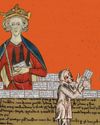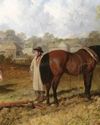
Matt Elton: Before we explore the causes of the revolutions of 1848, could you sketch out where and when they took place?
Christopher Clark: In January 1848, revolution broke out in Palermo and Naples, two major cities of what was then called the Kingdom of the Two Sicilies. This happened against a backdrop of demonstrations and protests that had been building across Europe. And then came the really big news: the revolution in Paris in the last week of February, which led to the flight of the king from the city and the collapse of the French monarchy. After that, the revolutions enter a kind of fusion phase in which there are chain reactions of uprisings: in Vienna, Berlin, Budapest, Bucharest. It just went on and on, cascading across the continent.
Rewinding to explore some of the causes, then, how important was poverty as a factor in the lead-up to these revolutions?
Poverty was the primary issue, and there was a degree of moral panic around it – although people at the time used the term “pauperisation” rather than poverty. The reason for that distinction was that, although commentators believed poverty had always existed in human societies, they thought that what was happening in the 1830s and 1840s was something new – a kind of systematic impoverishment of large sectors of society which had previously been able to make a living. Those people were now having to work all the hours god sent, but were still unable to make ends meet or feed their children. One of the chief sources of anxiety in cities was that the poor were getting poorer, and it wasn’t clear how far that process could go before it began to eat away at the bonds holding society together.
Bu hikaye BBC History UK dergisinin May 2023 sayısından alınmıştır.
Start your 7-day Magzter GOLD free trial to access thousands of curated premium stories, and 9,000+ magazines and newspapers.
Already a subscriber ? Giriş Yap
Bu hikaye BBC History UK dergisinin May 2023 sayısından alınmıştır.
Start your 7-day Magzter GOLD free trial to access thousands of curated premium stories, and 9,000+ magazines and newspapers.
Already a subscriber? Giriş Yap

Viking mussels
ELEANOR BARNETT digs into archaeological research to recreate a Viking-cum-AngloSaxon seafood dish from medieval York

Fingers, frog's and fairies
Fortune telling was all the rage in the 16th and 17th centuries, and practitioners would stop at nothing to tap in to the supernatural. Martha McGill tells a story of Highland seers, tarot cards and encounters with the spirit world

Nothing matches being with Alexander the Great on foot in the Hindu Kush
AT OUR LITTLE FILM COMPANY, MAYA VISION, we recently took the decision to digitise all of the rushes of our key films so that we could dispose of hundreds of boxes of tapes that had been kept in storage, throwing out stuff we thought we would never need again.

Library of the dead
Highgate Cemetery, created as a fashionable resting place for wealthy Victorian dead, is a veritable who's who of London's great and good. PETER ROSS roams the avenues of this most atmospheric necropolis

Slavery, exploitation and racism. These tragedies have long dominated histories of Africa. But there's another way to tell this story. And it's one that puts Africans right at the centre of their continent's extraordinarily rich and vibrant past
An 1414, in the Chinese city of Nanjing, a giraffe caused a stir. Amid a crowd of shocked, noble spectators, an official, leading the creature via a rope tied round its face, presented it to China's Yongle emperor. His officials said it was a qilin - an auspicious unicorn - which his sage governance had made appear.

England's forgotten hero
When the Hundred Years' War was reaching a climax, one man was fighting tenaciously to secure the English claim to the French crown. So why, asks Joanna Arman, is Henry V's formidable brother, John, Duke of Bedford, not better known?

HENRY III AND THE MAGNA CARTA THAT MATTERED
King John's sealing of a charter at Runnymede in 1215 is one of the most feted moments of the Middle Ages. Yet, writes David Carpenter, it was the charter issued by his son 10 years later that became fundamental to England's history

Gutenberg publishes a pioneering new book
‘The printing press triggers an information revolution

How empire ruptured rural Britain
We know that enslaved Africans and their descendants suffered in the distant colonies of empire. But, as Corinne Fowler explains, the colonial system also had dire impacts on people in the countryside of the 'motherland'

"I FELT VERY ALONE IN A WORLD GONE HORRIBLY MAD"
It was a moment of possibilities, dislocation and dread. Dan Todman tells the story of the 1.5 million urban Britons evacuated to the countryside at the start of the Second World War